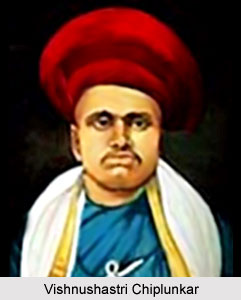 Vishnushastri Chiplunkar has been one of the most eminent leaders of Maharashtra. He had contributed immensely in all fields of Marathi culture, and is know for having inspired a sense of pride in the people regarding their culture. The year 1874 provides a useful benchmark in the history of Maharashtra. Vishnushastri Chiplunkar (1850-82), the son of an eminent scholar, started his own periodical, Nibandhamala, during that year. He single-handedly stimulated and pushed into action the educated middle class with a series of essays on a range of topics, such as literary criticism, the need to rehabilitate the Marathi language, social problems and prevalent attitudes, political issues, and philosophical questions.
Vishnushastri Chiplunkar has been one of the most eminent leaders of Maharashtra. He had contributed immensely in all fields of Marathi culture, and is know for having inspired a sense of pride in the people regarding their culture. The year 1874 provides a useful benchmark in the history of Maharashtra. Vishnushastri Chiplunkar (1850-82), the son of an eminent scholar, started his own periodical, Nibandhamala, during that year. He single-handedly stimulated and pushed into action the educated middle class with a series of essays on a range of topics, such as literary criticism, the need to rehabilitate the Marathi language, social problems and prevalent attitudes, political issues, and philosophical questions.
Chiplunkar represents the conservative reaction to the reformist tendencies that were prevalent in Indian society at the time. He attacked the educated people who displayed a servile attitude and mimicking the British. He brought precision, refinement, polish, ease, and compact writing style to the Marathi language. It is a point to note that even though he represents the conservative reaction to Westernisation, he himself was consciously emulating Western authors and philosophers. He was inspired by Macaulay, Mill, and Johnson. He wrote a biography of Johnson and completed the translation of his Rasselas, started by his father. He, through his essays in Nibandharnala, laid the foundation of literary criticism in Marathi.
Chiplunkar`s impact on social, political, literary, and intellectual spheres of Maharashtra goes beyond his writings. He understood the importance of periodicals, printing, publication, and education in mobilizing public opinion and cultural reproduction. To achieve those objectives, he started his own printing press, a publishing house, periodicals- a magazine and two newspapers, Kesari (in Marathi) and Maratha (in English)- and the New English School in Pune. He attracted able, dedicated, and distinguished collaborators like Bal Gangadhar Tilak, G. G. Agarkar, and M. B. Namjoshi. He deplored the tendency of the English education system to undermine the faith of the people in their own religion and culture. To redress the situation, the school, the periodicals, and the appeal to the glory of Maratha supremacy were laid down.
Chiplunkar accomplished a great deal during his short life and left an enduring legacy of self-confidence for a people who seemed lost, self-expression through service to the society, and political radicalism for the educated Marathi middle class. His tendency of social conservativism, inherited and perpetuated by Bal Gangadhar Tilak, persisted and shaped social thinking in Maharashtra for a long time. He influenced a whole generation, which included Tilak, Agarkar, H. N. Apte (novelist), S. M. Paranjape (journalist), V. K. Rajawade (historian), K. K. Damle (poet), and litterateurs like N. C. Kelkar and L. R. Pangarkar. The revolutionary influence of Chiplunkar was, however, restricted to the middle-class and educated Brahmins. In 1873, a year before Nibandhamala began publication; Mahatma Jyotiba Phule had started his Satyshodhaka movement. He had started his schools for women and the untouchables in 1851 and 1852, respectively. Chiplunkar started his New English School in 1880. Dinbandhu, a weekly, was started by Phule and K. P. Bhalekar in 1877.













